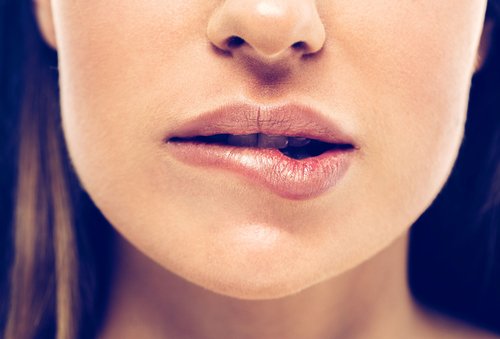Cheek biting, like nail biting, is a body-focused repetitive behavior (BFRB) that can be brought on by specific circumstances or emotions like stress, anxiety, & nervousness. While biting your cheek, lips, and/or tongue is a common habit, it is essential you do not cause pain or damage unnecessarily.
Causes of Cheek Biting
While cheek biting can be harmless, excessive cheek biting can be considered a body-focused repetitive disorder (BFRD) in which one causes physical harm to themselves through a habit. There are multiple potential causes for BFRD cheek biting, such as:
- Subconscious stress
- Boredom
- Overstimulation (coping mechanism)
Types of Cheek Biting
Cheek biting comes in different forms & can be brought about by different circumstances.
- Periodic Cheek Biting: Rare & accidental cheek or tongue biting may cause temporary damage like a cut or sore but is typically nothing to worry about.
- Regular Cheek Biting: Regular accidental cheek biting may indicate teeth misalignment.
- Sleep Cheek Biting: Biting your cheeks while asleep
- Habitual Cheek Biting: Biting cheeks out of habit.
- BFRD: BFRD cheek biting is both excessive & obsessive & can lead to discomfort, pain, & mouth damage.
Why is Cheek Biting Bad?
Chronic cheek biting can cause long-term damage & lead to other serious consequences.
- Damage & infection: If you bite your cheeks often, the repeated trauma to your oral tissues can cause mouth sores. Not only are these sores painful, they can lead to serious infection if not managed properly.
- Malocclusion: Malocclusion occurs when your bite is misaligned & can lead to more serious problems, like headaches, jaw soreness, or even lead to temporomandibular joint disorder (TMD).
- Cancer Risks: Chronic cheek biting does not cause oral cancer, irritation from cheek biting can progress oral cancer. Learn more about oral cancer screenings with Lakeview Dental Care.
Ways to Stop Biting Your Cheek
Depending on the severity & cause of cheek biting, there are different levels of treatment to stop biting your cheeks.
Habitual Cheek Biting
Your dentist can help identify treatments to correct habitual cheek biting. If you accidentally bite your cheeks often, this may indicate teeth misalignment that can easily be corrected by orthodontic treatments like Invisalign®.
If you bite your cheeks while asleep, your dentist may recommend a custom nightguard, which can also combat teeth grinding.
Chronic Cheek Biting
While dental & orthodontic treatments can help, BFRD chronic cheek biting may require further treatment from mental health professionals.
When to See a Dentist for Cheek Biting
If you unintentionally bite your cheeks often, it is a good idea to speak with your dentist to identify any teeth or jaw misalignment.
Consult a Lakeview Dental Care Dentist
If you chronically bite your cheeks, the dentists at Lakeview Dental Care can address any immediate concerns like sores or infection & help you find long-term solutions to stop biting your cheeks. Schedule an appointment at any of our dental offices today!





